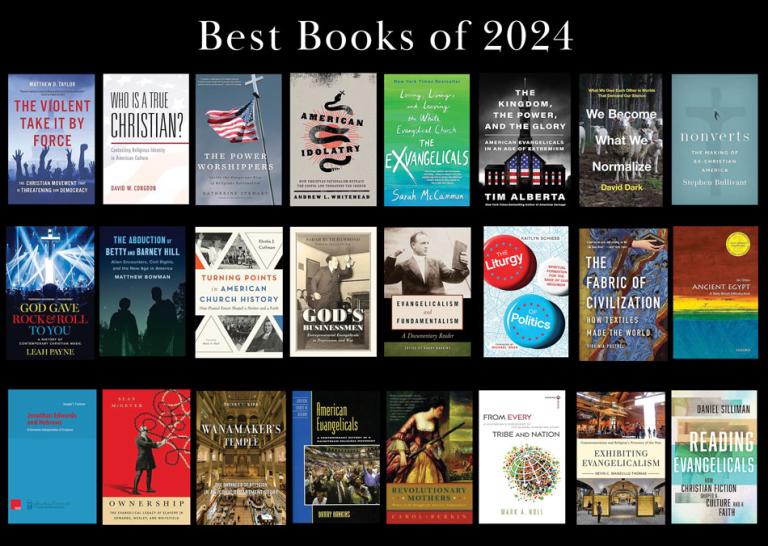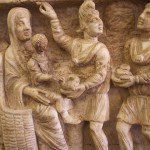The past couple years I have provided a round-up of my favorite reads (see here for 2022 and here for 2023), which I refer to as the best books of the year. Some are old and some are new. But here is my selection for this year. I’ll start with my top 10 reads in the new/recent book category. I’ll then turn to highlighting other, less recent, but valued reads that occupied my attention this year.

1. God Gave Rock and Roll to You (OUP, 2024) by Leah Payne.
This book rightly deserved the CT Book Award for history this year. I fully anticipated that Dr. Payne would receive this award. It’s well deserved. This book has lucid prose, interesting narrative, and outstanding interpretations on this history of CCM. Payne’s personal history with CCM and enthusiasm for her research was an added benefit to her work. You may wish to listen to my conversation with Dr. Payne about this book on the CFH podcast here.
2. The Violent Take It by Force (Broadleaf, 2024) by Matthew Taylor.
I just finished Matthew Taylor’s riveting account of the rise of the New Apostolic Reformation (NAR). Organized as a series of microbiographies, which provide incisive observations on the rise of Christian Nationalist agitation in the political sphere, this book makes sense of how Christians played a vital influence to events leading up to and during the insurrection at the capitol. Matthew Taylor connects a lot of dots for us to see how the foundational theology of the NAR leans towards militancy.
3. The Abduction of Betty and Barney Hill (YUP, 2024) by Matthew Bowman.
Matthew Bowman gives readers far more than the eccentric story of the Hills. He teases out the function of conspiracy theorizing, the desire to seek intellectual legitimacy for UFOs, and the role that race and global geopolitics played in the psyche of both Barney and Betty Hill, leading up to and after that remarkable day of their “abduction.” This book was a brilliant piece of historical writing.
4. Turning Points in American Church History (Baker, 2024) by Elesha Coffman.
As an American historian, I am always looking for smart surveys that paint both large strokes and tiny ones to make the canvas of history thick and beautiful and striking. Coffman delivers a rich text that I’ll be turning to for years to offer students short supplementary readings to the American Yawp, on U. S. church history, or as a single volume text for a one-semester survey of U. S. church history. If you’re interested in a single-volume U. S. church history, this one now sits at the top of my recommendation list.
5. The Exvangelicals (St. Martin’s, 2024) by Sarah McCammon.
The genre of evangelical departure narratives has been a boon over the last couple years, and this addition to the body of literature is itself a fascinating installment. McCammon has a way of offering vulnerability and critique with lighthearted story-telling and anecdotes that lend this memoir to be one of those that could be turned into a cinematic portrayal.
6. American Idolatry (Brazos Press, 2024) by Andrew L. Whitehead.
Whitehead’s accessible and practical study on the threat of Christian nationalism has a pastoral touch to it, which makes the book a formational offering for Christian living that is consistent with the Jesus ethic of the Gospels. Paralleling this feature with the scholarly expertise of a first-rate sociologist, who has spent years researching this subject, this book is an authoritative and accessible guide for smashing the idol of white Christian nationalism, the kind of iconoclasm this historian can get behind.
7. We Become What We Normalize (Broadleaf, 2023) by David Dark.
David Dark has a knack for pulling together a rich array of ideas and presenting them with the skill of a literary genius. Not many pieces of non-fiction I read are arranged in a style that I’d describe as poetic, but Dark’s ornate assembly of prose in this book made me feel like he read it to me as the two of us strolled through an art gallery. This book matured my instincts and habits to be more reflective and less reactive, which has helped me slow down and process the rapid changes I’ve experienced in the 21st century. This book made me think different about secularity and how to navigate it today.
8. Who Is a True Christian (Cambridge University Press, 2024) by David W. Congdon.
While I still haven’t finished this book quite yet, I’ve found Congdon’s careful scholarship, expertise, and courage to work at the boundaries to niggle us—not just about what it has meant, in the broadest sense of the idea, to be Christian, but to revisit and challenge the approaches, philosophies, and social understandings of how ideas like othering, political power, and pluralism have shaped our perspectives of “orthodoxy” and “heterodoxy”—to be a welcomed challenge to my past presuppositions. Congdon’s, may I say, risky work is refreshing.
9. The Kingdom, the Power, and the Glory (Harper, 2023) by Tim Alberta.
A book I ate like candy at the beginning of the year was this one from Tim Alberta. A blend of memoir and journalism, this book is written in a style much like Exvangelicals and The Violent Take It By Force. This genre continues to grow on me, and I yet have become fatigued by various “evangelical” narratives from the late 20th/early 21st centuries. I call this genre “perseverance narratives” because these works end with a conflicted sentiment about evangelicalism that nonetheless conveys the notion that no matter how bad things get with the church in the U. S. or the wounds the memoir writer has endured, they seem to be resilient to apostasy. This, itself, is heartening to me.
10. The Power Worshippers (Bloomsbury, 2022) by Katherine Stewart.
I missed this book when it first released, but it is a noteworthy one not just worth mentioning but worth urging you to carefully read. Katherine Stewart’s coverage is haunting in detail and arresting. Some of the consequences of Christian Nationalism are flat-out deadly. This book has only proven to be more prescient since the outcome of the recent election.
Highlights of Other Valued Reads During 2024
My reading program was greatly affected this year by my research program on Brand Evangelicals (Brazos, expected 2026). Thus, there were some books on the history of Christian business and evangelicals that I needed to read, as I continued to reflect on my interpretation and argument for evangelical history, which emphasizes a brand interpretation and description of evangelicals.
I had the pleasure of having a conversation with the authors of Exhibiting Evangelicalism (University of Massachusetts Press, 2022), written by Devin Manzullo-Thomas, and Reading Evangelicals (Eerdmans, 2021), written by Daniel Silliman, earlier this year, on The Conference on Faith and History podcast. You can go back and learn more about those valuable contributions to the genre of evangelical history by listening to those recordings here and here. Wanamaker’s Temple (NYU Press, 2018) by Nicole C. Kirk and God’s Businessmen (University of Chicago Press, 2017) by Sarah Ruth Hammond provided much of the longer history of fundamentalists and evangelicals, who employed their business savviness for “kingdom purposes.” While God’s Businessmen had a broader geographical range, it did highlight the business of fundamentalist and evangelical Christian businessmen in Chicago, whereas Wanamaker’s Temple featured a context in New England, particularly Philadelphia. These geographic distinctions and the distinctives of what unfolded in various regions is worth noting. In addition, I appreciated a pair of Barry Hankins’s outstanding contributions to evangelical history: American Evangelicals (Rowman & Littlefield, 2008) and his reader, Evangelicalism and Fundamentalism: A Documentary Reader (NYU Press, 2008). These books were particularly of benefit as I prepared my summer class for Christ Church, Oak Brook’s adult class, called Fundamentalists v. Evangelicals.
Because my teaching schedule at Purdue University Northwest required a fresh prep for an Ancient Civilization survey course, I had the opportunity to dabble in various studies of ancient civilizations. A go-to for me continues to be the Oxford Very Short Introduction series books. While I only listed the Ancient Egypt (OUP, 2021) volume on the graphic above, in reality I also enjoyed the volumes on The Ancient Near East (OUP, 2013), The Vikings (OUP, 2005), and The Celts (OUP, 2003) as well. The Fabric of Civilization (Hatchette, 2021) by Virginia Postrel is a wonderful global history of a commodity that has shaped so much of life. The way the author became immersed in research on this topic is absolutely inspiring.
Three splendid miscellaneous reads included Revolutionary Mothers (Penguin, 2006) by Carol Berkin, The Liturgy of Politics (IVP, 2020) by Kaitlyn Schiess, and From Every Tribe and Nation (Baker Academic, 2015) by Mark Noll. The historical recounts from Berkin’s book filled a lacuna in my study of revolutionary history. Schiess’s book was a much needed read for me on public theology during this recent election cycle. She’s such an insightful writer. Finally, I appreciated Mark Noll’s recount of how he discovered the significance of global Christian history and how it shaped his own research and writing program.
No book did I read with more care this past year and with a ruthless editorial eye than one that has yet to release. It publishes in just a handful of weeks, and I’ll be sharing more about it in my next column. But I thought I’d share about the book that has been a labor of love over the last decade, Jonathan Edwards and Hebrews: A Harmonic Interpretation of Scripture (Vandenhoeck & Ruprecht, 2025). This book is Volume 9 in the New Directions in Jonathan Edwards Studies series, which is edited by Harry S. Stout, Kenneth P. Minkema, and Adriaan C. Neele. I’m rather proud that my piece of scholarship and first book length contribution to Jonathan Edwards studies has been accepted into this distinguished series. The publisher is still populating this book to various online stores, so it’s not yet available in the U. S. Amazon store, but it will be soon enough. Alongside revising and editing this study over the past year, I also have been reading Sean McGever’s book, Ownership (IVP, 2024). I’ll be sharing more about McGever’s book and the current state of the field for Jonathan Edwards studies in my next column. Stay tuned.













